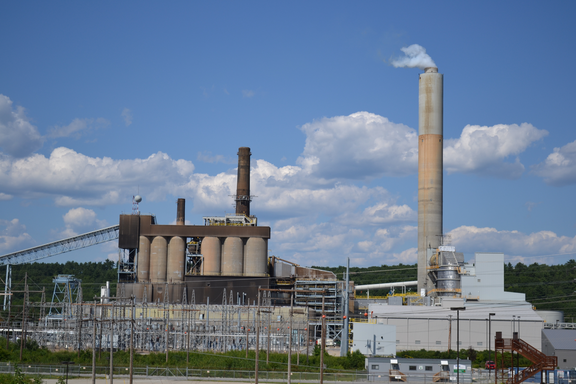The largest remaining coal-fueled power plant in New England, New Hampshire’s 482-megawatt (Mw) Merrimack Station, will remain in operation through at least May 2024, per an agreement with ISO New England, the company that operates the transmission system and purchases and sells power across Connecticut, Maine, Massachusetts, New Hampshire, Rhode Island, and Vermont.
Granite Shore Power, Merrimack’s owner, won ISO New England’s auction to provide supplementary power during periods of peak demand. The company will receive $676,000 per month from June 2023 through May 2024, a total of $8.1 million, in return for being prepared to generate power at any time the need arises.
Granite Shore’s 155 Mw Schiller Station power plant, with separate power generating units capable of burning biomass and coal or oil, failed to win a contract in ISO New England’s most recent capacity auction.
Securing the Power Supply
ISO New England conducts an auction each year to ensure enough power plants will be operational three years hence to meet projected demand. Electric-power-generating plants within the ISO New England’s service area compete to secure capacity payments at the auction.
Capacity payments are made regardless of whether emergency electricity is needed and are paid in addition to any per-kilowatt income a power plant receives for its normal generation of power.
The fact that the Merrimack Station won the most recent capacity auction is good news for the town of Bow, New Hampshire, which receives substantial property tax revenues from the power plant.
Circumstances Favored Coal
Merrimack’s continued operations buck the trend of coal power plant closures in many areas of the country due to federal and state support for renewable power supplies and price competition from natural gas power plants.
New England faces potential power shortfalls that would have been worse without Merrimack’s continued operation, because environmental groups have persuaded state governments and local federal legislators to prevent the expansion of natural gas pipelines and power plants in the region.
For instance, in 2016 Kinder Morgan, one of the largest energy infrastructure companies in North America, cancelled a proposed $3.3 billion Northeast Energy Direct pipeline to provide natural gas to utilities and power generators in three New England states, in the face of strong opposition from environmental groups, including ongoing regulatory battles and legal challenges. With some cities in the region announcing they would no longer allow new natural gas hookups, and Sen. Edward Markey (D-MA) and presidential aspirant Sen. Bernie Sanders (I-VT) cosponsoring the Green New Deal, which would make it nearly impossible for natural gas power plants to operate, utility companies in the region were unwilling to commit to purchasing natural gas from the pipeline. Lacking committed customers for its natural gas, Kinder Morgan jettisoned its pipeline plans.
With no new coal or natural gas capacity, and with ever-increasing renewable power mandates, New England today has the highest electricity prices of any region in the “Lower 48” states, averaging 20.8 cents per kilowatt-hour (kwh) in January 2020, compared with the national average of 13.4 cents per kwh.
Politics Undermining Supply
A January 2018 ISO New England report, “Operational Full-Security Analysis,” found fuel security risk—the possibility that power plants won’t have or be able to get the fuel they need to run, particularly in winter—is the foremost challenge to power grid reliability in New England. That report was issued in the middle of the harsh winter of 2017-18, when the operator warned of a serious risk of rolling blackouts.
During that “unexpected” cold snap, much of the natural gas that powers regional electric generating plants was diverted to heat homes. Electricity providers had to turn to older coal- and oil-fueled power plants, which were burning fuel at rates that led officials to fear their fuel tanks might run dry.
Absent new natural gas capacity, New England lacks sufficient capacity to provide reliable 24/7 energy during peak demand periods. The region must rely on coal and even expensive—and relatively dirty—oil power plants during peak load scenarios, says Andrew Kline, president of the Joshua Bartlett Center for Public Policy.
“Some of New England has switched from coal and oil to cleaner-burning natural gas, but a shortage of pipeline infrastructure puts the region at risk of blackouts during periods of peak demand, which is why the grid operator insists a few strategic plants be maintained as backup power sources,” Kline said. “Coal is not necessarily the preferable fuel source for peaking power plants, but solar and wind can’t be turned on by flipping a switch, whereas coal-fueled plants can.
“Nuclear is reliable, too, but it’s not politically fashionable in New England, so coal is the default backup source,” Kline said.
‘Misguided Policy’
The New England states jointly share the blame for their energy supply and cost problems, says Steve Goreham, executive director of the Climate Science Coalition of America.
“The six New England states jointly adopted a policy of ‘strategic electrification,’ seeking to replace natural gas and propane appliances with electric appliances and heat pumps, all to be powered by electricity almost entirely from wind and solar systems, yet heat pumps perform poorly during New England winters, and the sun often doesn’t shine,” Goreham said. “This misguided policy has brought about a shortfall in gas pipeline capacity, ultimately leaving New England facing critical energy shortages.
“State government efforts to block gas pipelines have raised electricity costs for New England residents,” Goreham said. “Intermittent wind and dilute solar energy are not suitable power sources for modern society, which requires electricity to be always available. Government officials should rethink unrealistic renewable energy mandates.”
Duggan Flanakin (dflanakin@gmail.com) writes from Austin, Texas.

























